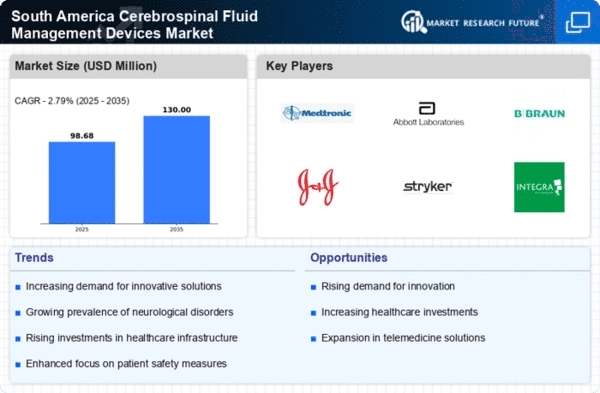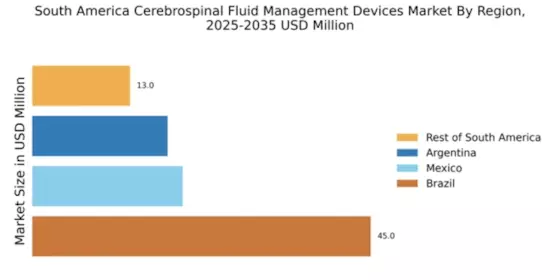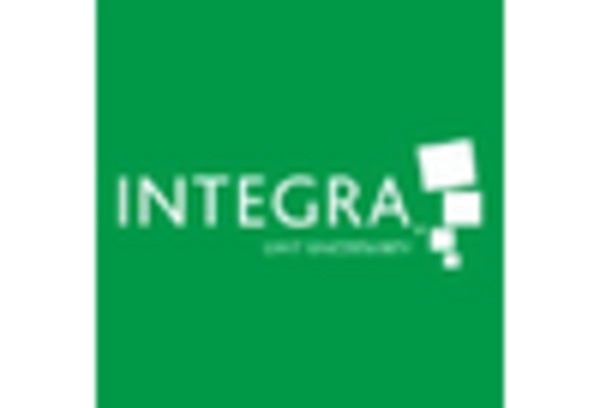Rising Prevalence of Hydrocephalus
The cerebrospinal fluid-management-devices market in South America is significantly influenced by the rising prevalence of hydrocephalus, a condition characterized by an accumulation of cerebrospinal fluid in the brain. This increase is particularly evident in pediatric populations, where congenital hydrocephalus is a common diagnosis. As awareness of this condition grows, healthcare providers are more likely to invest in effective management solutions, including cerebrospinal fluid-management devices. Recent estimates suggest that hydrocephalus affects approximately 1 in 1,000 live births in South America, leading to a heightened demand for specialized devices. Consequently, this trend is expected to drive market growth, as healthcare systems prioritize the development of effective treatment protocols.
Increasing Awareness of Neurological Health
The cerebrospinal fluid-management-devices market in South America is witnessing a rise in awareness regarding neurological health issues among the general population. Educational campaigns and community outreach programs are contributing to a better understanding of conditions that require cerebrospinal fluid management, such as hydrocephalus and meningitis. As individuals become more informed about these health concerns, there is a corresponding increase in demand for effective treatment options. This heightened awareness is likely to lead to more patients seeking medical attention, thereby driving the need for cerebrospinal fluid-management devices. Market projections suggest that this trend could result in a 10% increase in device utilization over the next five years, further propelling market growth.
Growing Investment in Research and Development
The cerebrospinal fluid-management-devices market in South America is benefiting from a growing investment in research and development (R&D) by both public and private sectors. This investment is aimed at fostering innovation in medical technologies, particularly those related to cerebrospinal fluid management. As research institutions collaborate with medical device manufacturers, new and improved products are being developed, which could enhance treatment efficacy and patient safety. Market analysts project that R&D spending in this sector could reach $50 million annually by 2027, indicating a strong commitment to advancing medical technology. This focus on innovation is likely to create a competitive landscape, driving further growth in the cerebrospinal fluid-management-devices market.
Increasing Demand for Advanced Medical Devices
The cerebrospinal fluid-management-devices market in South America is experiencing a notable surge in demand for advanced medical devices. This trend is largely driven by the growing awareness among healthcare professionals regarding the efficacy of innovative technologies in managing cerebrospinal fluid. As hospitals and clinics seek to enhance patient outcomes, the adoption of sophisticated devices is likely to increase. Market data indicates that the revenue generated from cerebrospinal fluid-management devices in South America is projected to reach approximately $150 million by 2026, reflecting a compound annual growth rate (CAGR) of around 8%. This growth is indicative of a broader shift towards modernization in healthcare practices, emphasizing the importance of investing in advanced medical technologies.
Government Initiatives for Healthcare Improvement
Government initiatives aimed at improving healthcare infrastructure in South America are playing a crucial role in the cerebrospinal fluid-management-devices market. Various national health programs are being implemented to enhance access to advanced medical technologies, particularly in underserved regions. These initiatives often include funding for hospitals to acquire modern medical devices, thereby facilitating better management of cerebrospinal fluid-related conditions. For instance, recent government budgets have allocated approximately $200 million towards upgrading medical facilities, which is likely to include investments in cerebrospinal fluid-management devices. Such efforts not only improve patient care but also stimulate market growth by increasing the availability of essential medical technologies.


















Leave a Comment